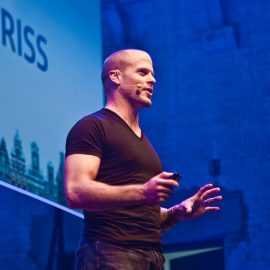

This article gives you a glimpse of what you can learn with Shortform. Shortform has the world’s best guides to 1000+ nonfiction books, plus other resources to help you accelerate your learning.
Want to learn faster and get smarter? Sign up for a free trial here .
What’s the secret to achieving financial success? How can you break free from the rat race and begin making serious money?
Most people believe that the key to achieving financial success is getting a good, high-paying job. However, trading your time to make someone else’s dreams come true can hardly be called success—even if it pays well. What good is getting paid a lot of money if you don’t even have the time to spend it?
With this in mind, here’s what it takes to achieve real financial success.
Reprogram Your Money Mindset
When it comes to making money, people tend to look for opportunities that fall within their realm of possibilities. However, what many people fail to realize is that what’s possible in their minds is not what is objectively possible given their talents, resources, and capabilities. According to T. Harv Eker, the author of Secrets of the Millionaire Mind, most people underestimate how much money they are capable of making because of the money mindset they had been conditioned into in childhood.
As a child, you unconsciously absorbed thoughts, emotions, and beliefs about money from your role models and your environment. Everything you heard, saw, and experienced about money influenced your beliefs about how to manage your finances, and conditioned you to behave in specific ways. These thoughts and opinions now make up your mindset and determine what you believe about money. These beliefs then unconsciously dictate how you think, feel, and behave when you manage your finances.
For example, if your role models worked hard but never had enough money to enjoy themselves, you may have the belief: “There is never enough money, no matter how hard I work.” This belief creates an uncomfortable feeling every time you think about going to work or managing your finances, and it leads you to act in unproductive ways such as frivolously spending your money instead of saving it. Your discomfort may also cause you to resent people who do have enough money. In contrast, if you grew up in an environment where money was not a cause for concern because there was always enough, you’re less likely to feel discomfort or resentment around the subject of work and money.
According to Eker, the first step to achieving financial success is to work on overriding your unproductive thoughts and beliefs about money with productive thoughts and beliefs.
TITLE: Secrets of the Millionaire Mind
AUTHOR: T. Harv Eker
TIME: 32
READS: 66.1
IMG_URL: https://www.shortform.com/blog/wp-content/uploads/2021/11/secrets-of-the-millionaire-mind-cover.png
BOOK_SUMMARYURL: secrets-of-the-millionaire-mind-summary-t-harv-eker
AMZN_ID: XYZ
How to Make Money
Your money mindset is a necessary prerequisite for achieving financial success, but thinking positively about money is not enough to make you rich. Once your mindset is in order, you need to come up with sound methods to make money. According to Robert Kiyosaki, there are four main categories of money-making methods—what he calls “cashflow quadrants”:
1) Employees (E). In the E category, employees generate income by agreeing to do work in exchange for a salary. They have a boss and a paycheck. Employees choose the E category because they value security and certainty. Traditional thinking says E category jobs are stable because they offer steady income and a clear job description. But there are downsides—the biggest disadvantage of an E category job is lack of control over your own work.
2) The Self-Employed and Small Business Owners (S). In the S category, small business owners and the self-employed are their business. They are their own boss, and they can also be the boss of other people, but without their labor, expertise, and management, their businesses can’t run. Their income is the profit from their business. People in the S category see it as the most stable way to generate income because they have the most control. The biggest disadvantage to trying to make a living in the S category is that most small businesses fail.
Moreover, S’s are at particular risk for burnout because they have to perform all the functions of their business, not just their core competency. A self-employed stylist has to be her own marketing team, do all her own invoices and expenses, and plan all her own travel. Like E’s, if an S business does succeed, success means long hours and a lot of hard work.
3) Big Business Owners (B). People in the B category control not only a business, but a business system. If they leave, the work still gets done. People in the B category own their business and generate income by its profit, though they no longer do the day-to-day labor of making it function. A B’s income is the profit from their business, and their business is considered an asset. B’s need to be skilled in delegation and leadership, as well as have a high degree of financial literacy.
4) Investors (I). In the I category, investors commit money (called capital) to something and expect to make a profit. Beyond the initial investment, they don’t have to work day to day like those in the other categories do. Instead, their livelihood comes in the form of assets that generate passive income. Examples of passive income include dividends from stocks, interest on bonds, and rental income. I’s need to be comfortable with risk, since managing risk is the foundation of investing.
According to Kiyosaki, the first two income categories, employees (E) and the self-employed and small business owners (S), are usually dead-ends on the road to achieving financial success. The other two categories, big business owners (B) and investors (I), are the most conducive to accumulating wealth and achieving financial success because those are the categories in which you can develop income-generating assets.
TITLE: Rich Dad's Cashflow Quadrant
AUTHOR: Robert T. Kiyosaki
TIME: 41
READS: 82.7
IMG_URL: https://www.shortform.com/blog/wp-content/uploads/2020/11/rich-dads-cashflow-quadrant-cover.png
BOOK_SUMMARYURL: rich-dads-cashflow-quadrant-summary-robert-t-kiyosaki
AMZN_ID: XYZ
Entrepreneurship
As Kiyosaki points out, entrepreneurship is one of the two foolproof ways to achieve financial success. However, most people aren’t cut out for building a business, let alone a big business that generates passive income. This requires commitment and sacrifice, which most people lack.
Most people go after get-rich-quick schemes because they think there’s a shortcut to wealth. As a result, instead of taking constructive actions to improve their finances, they waste time and energy trying to get rich fast with get-rich-quick schemes that fail to generate the income they promise.
If you want to build massive wealth, you must build a business that creates massive value, and creating massive value takes a lot of time, creativity, and dedication. Entrepreneur and investor MJ DeMarco (Unscripted) suggests that you examine your skills, knowledge, or assets and think about how they can create massive value for others. Ask yourself questions such as, “What problems or inconveniences can I resolve?” or, “How can I improve upon products or services that I already use?” Answering these questions will help you align your skills and abilities with valuable money-making opportunities.
Investing
There are so many things you could invest in these days: stocks, index funds, cryptocurrencies, real estate, futures, options, NFTs—the list can go and on.
The right assets to invest in for you will depend on a number of factors such as the amount of money you’d like to invest, your risk tolerance, knowledge of the corresponding markets, and so on. With this in mind, here are some things you should consider when choosing your investments in some of the major asset classes:
Stocks
According to American Investor Peter Lynch (One Up on Wall Street), you should invest in stocks of companies you’re familiar with—perhaps you buy their products or understand the industry. Familiar companies are the greatest to invest in because you have the best odds of understanding them and how well they’ll perform. For instance, if you regularly order house plants from a great online plant store, you have a strong knowledge of that company, which might make its stocks worth investigating. Similarly, if at work, you deal often with a great printing company, you have inside knowledge of that company—an advantage in deciding if you should invest.
Conversely, Lynch strongly warns against investing in companies you don’t understand, trendy companies everyone else is investing in, companies that are diversifying, or companies that supply to only a single buyer. Such companies are likely to fail sooner or later.
When on the lookout for stocks to invest in, Lynch recommends paying particular attention to companies with the following positive attributes:
- Companies that are—or sound—mundane or unappealing: Unglamorous companies (like waste removal or pest control companies) often do well but don’t attract investor attention until stocks are high. For this reason, investigate companies with boring or unappealing names, as this may indicate the company is uninteresting to most investors and therefore attractive.
- Companies that have branched off from larger companies: When a subsidiary becomes its own company, it’s often successful because the parent company ensures the subsidiary is in good financial standing beforehand.
- Companies in no-growth industries: Seek out companies in industries that seem not to be growing at all because this indicates there’s little competition in such industries, and strong companies can flourish.
Index Funds and Mutual Funds
If you have a low risk tolerance and don’t mind growing your wealth at a steady pace, consider investing in index funds. Various indexes, such as the Dow Jones Industrial Average and the S&P 500, use selected stocks as a measure of how the market as a whole is doing. In 1976, John Bogle, founder of The Vanguard Group, introduced the first public index fund for investors, replicating the S&P 500.
According to J. L. Collins, the author of The Simple Path to Wealth, index funds are much safer than professionally managed mutual funds because they get better results over the long term and have lower fees. The chances of anyone regularly selecting stocks that beat the market are minuscule, so you can get better results by buying into an index that contains a lot of stocks (e.g. VTSAX Total Stock Market Index covers over 3,700 companies) that grow steadily over time.
By investing in index funds, you can passively grow wealth at the pace of the market.
Collins touts Vanguard’s VTSAX Total Stock Market Index Fund as the simplest and most effective investment for tapping into the market’s wealth-building capabilities.
TITLE: The Simple Path to Wealth
AUTHOR: JL Collins
TIME: 30
READS: 98.9
IMG_URL: https://www.shortform.com/blog/wp-content/uploads/2020/11/the-simple-path-to-wealth-cover.png
BOOK_SUMMARYURL: the-simple-path-to-wealth-summary-jl-collins
AMZN_ID: XYZ
Investing in Cryptocurrencies
Though some may rise and some may fall, overall, cryptocurrencies are here to stay—the industry is large enough now that big players have vested interests in its success. As such, you can reap big rewards from investing into certain cryptocurrencies.
However, cryptocurrencies are highly volatile. To put it into perspective, Bitcoin dropped from $64,000 in April 2021 to $30,000 in May of the same year. Until these currencies show some signs of stability, it isn’t wise to allot them more than a small percentage of your portfolio.
Real Estate
Real estate is a great investment because real estate prices tend to consistently rise over time. However, there are a number of risks inherent in real estate investing:
- Real estate prices in your area may decrease rather than increase over time. Recessions may impact your ability to make your mortgage payments or sell your home for a profit.
- Interest rates on mortgages fluctuate; if you have a variable-rate mortgage and interest rates go up, so does your monthly payment.
According to David Chilton, the author of The Wealthy Barber, you shouldn’t invest into real estate until you’ve first built up some assets: Many young people aren’t in good enough financial shape to qualify for a loan on a down payment, so when you’re starting out it’s best to confine your investments to stocks or mutual funds for a while.
TITLE: The Wealthy Barber
AUTHOR: David Chilton
TIME: 16
READS: 30
IMG_URL: https://www.shortform.com/blog/wp-content/uploads/2022/07/the-wealthy-barber-cover.png
BOOK_SUMMARYURL: the-wealthy-barber-summary-david-chilton
AMZN_ID: XYZ
Good Money Habits
It’s true that investing and running your own business are your best bets if you want to acquire serious wealth. However, to be able to invest or open a business, you need to have quite a lot of money to begin with. While it won’t happen overnight, you can build the initial capital by working and practicing good money habits:
1) Create and live by monthly and annual budgets. Budgeting is one of the important good financial habits you must master. More than half of all millionaires budget their expenses. They’re motivated by visualizing the long-term rewards of achieving financial success and being able to retire.
2) Know what your family spends annually for basic needs (food, clothing, and shelter). Fully 62% of the millionaires surveyed knew their monthly expenses, compared to 35% of high-income non-millionaires.
3) Set specific daily, monthly, yearly, and life goals. Most millionaires are goal-oriented and take a long-term view. Their goals are not spending and acquiring material possessions, but being able to retire, be financially secure, and enjoy life. People who are financially secure are happier than those in their age/income category who aren’t. Unlike those living paycheck to paycheck, they don’t worry about the next economic slump.
4) Spend time planning your financial future. The number of millionaires who spend time planning investments is more than double the number who don’t plan. Many of those who don’t plan are high-income under-accumulators.
5) Beware of giving ongoing subsidies to adult children and grandchildren, who may become dependent on them instead of self-reliant. Millionaire parents who provide ongoing gifts and subsidies have significantly less wealth than others in their category whose children are independent.
TITLE: The Millionaire Next Door
AUTHOR: Thomas J. Stanley and William D. Danko
TIME: 22
READS: 119.6
IMG_URL: https://www.shortform.com/blog/wp-content/uploads/2020/11/the-millionaire-next-door-cover.png
BOOK_SUMMARYURL: the-millionaire-next-door-summary-thomas-stanley-william-danko
AMZN_ID: XYZ
Final Words
Most people are capable of becoming millionaires if they’re willing to consume less and control their spending in order to invest and/or open their own businesses. The trade-off for spending less of your income today is financial freedom tomorrow.
If you enjoyed our article about achieving financial success, check out the following suggestions for further reading:
In Money: Master the Game, motivational speaker and life coach Tony Robbins argues that anyone can master money, achieve financial success, and create their dream lifestyle. In Robbins’ view, to master money means building an investing strategy that yields passive income for life and gives you the choice of when, where, and whether to continue working. Conversely, neglecting to master money means that you’ll always need to trade your time for money.
Poor Charlie’s Almanack is a collection of Charlie Munger’s best advice given over 30 years, in the form of 11 speeches given as commencement addresses and roundtable talks. He covers a wide range of topics, including rationality and decision making, investing, and how to live a good life. You’ll learn why Charlie considers multidisciplinary learning vital to success, his checklist for investment criteria, and how to build a trillion dollar company from scratch.
Most of us assume financial success depends on education and intelligence. But in The Psychology of Money, finance expert Morgan Housel presents an alternate hypothesis: The key to achieving financial success lies in understanding human behavior. Housel posits that when you understand how emotions and beliefs influence your financial decisions, you’ll make better financial decisions.

Want to fast-track your learning? With Shortform, you’ll gain insights you won't find anywhere else .
Here's what you’ll get when you sign up for Shortform :
- Complicated ideas explained in simple and concise ways
- Smart analysis that connects what you’re reading to other key concepts
- Writing with zero fluff because we know how important your time is






